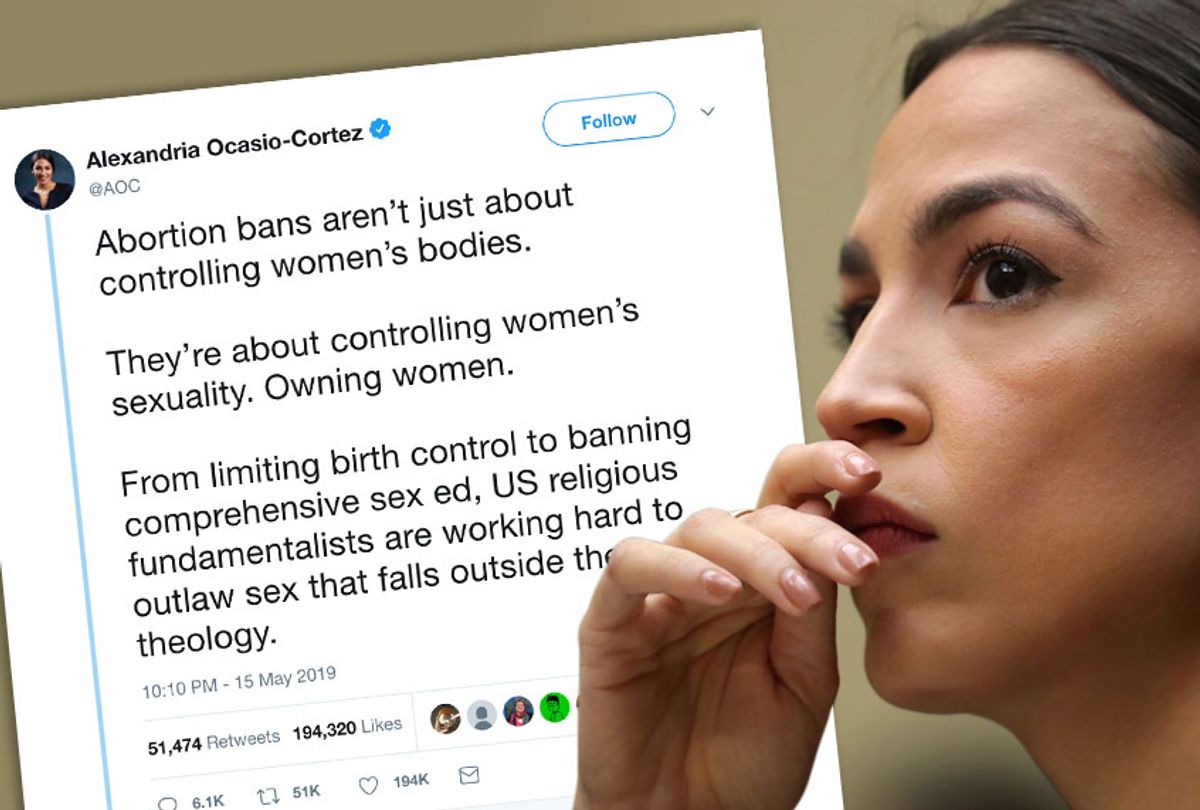Rep. Alexandria Ocasio-Cortez, D-N.Y., has joined the widespread and growing criticism of restrictive abortion bills that have been signed into law this year in various states across the country, setting up a direct challenge Roe v. Wade, the landmark U.S. Supreme Court decision from 1973 that said a woman has a constitutional right to end a pregnancy until the fetus is developed enough to live outside the uterus.
Missouri's Republican-controlled Senate voted early Thursday to ban abortions eight weeks into pregnancy — even in cases of rape, incest or human trafficking. The bill says a non-complying doctor could be charged with a felony and face up to 15 years in prison for performing an abortion in most circumstances.
The measure, known as the Missouri Stands for the Unborn Act, came a day after Alabama's governor signed into law a ban on abortions at any time absent a medical emergency. It places Missouri in line with states including Georgia, Ohio, Kentucky and Mississippi that passed so-called "heartbeat" bills that outlaw abortions once a fetal heartbeat can be detected, which can be as early as six weeks and before many women know they are pregnant. Utah and Arkansas also voted to ban the procedure after the second trimester.
In the wake of attempts to restrict the procedure, the freshman congresswoman tweeted Thursday that abortion bans "aren't just about controlling women's bodies."
"They're about controlling women's sexuality. Owning women," she continued. "From limiting birth control to banning comprehensive sex ed, US religious fundamentalists are working hard to outlaw sex that falls outside their theology."
"Ultimately, this is about women's power," Ocasio-Cortez wrote in a second tweet, adding that "when women are in control of their sexuality, it threatens a core element underpinning right-wing ideology: patriarchy."
"It's a brutal form of oppression to seize control of the 1 essential thing a person should command: their own body," she added.
The bills in Alabama and Missouri have moved through the states at a time when opponents of legal access to abortion nationwide have been emboldened by the transformation of the Supreme Court with the confirmation of Justice Brett Kavanaugh, which secured a conservative majority on the nation's highest court for decades to come.
Supporters of such restrictions say fetuses are humans and deserve human rights. Many supporters are Christians and believe the Bible forbids most abortions.
Opponents of the legislation, including the American Civil Liberties Union and Planned Parenthood, have vowed to sue to block the measure if it becomes law. They intend to argue that a state cannot restrict access to abortion before viability — the point at which a fetus can survive outside the uterus — which is a right that federal courts have repeatedly reaffirmed in decisions since Roe. Any restriction on abortion must contain exceptions to protect the life and health of the woman and cannot create an "undue burden" on a woman seeking an abortion — a standard that was established in Planned Parenthood v. Casey" in 1992 and clarified in Whole Woman's Health v. Hellerstedt in 2016.
In Alabama, a conservative state where Republicans have long dominated politics and there are just three abortion clinics that regularly provide care, has a documented history of attempting to curb abortion access. Last year, voters supported an amendment to the Alabama Constitution declaring that the "public policy of this state is to recognize and support the sanctity of unborn life and the rights of unborn children, including the right to life."
In the past, lawmakers set a 48-hour waiting period for abortions; mandated that women receive state-directed counseling before the procedure; required a woman to undergo an ultrasound before obtaining an abortion (and the provider must offer her the option to view the image); and required minors to receive consent for an abortion from a parent or legal guardian.
Before Thursday's vote in Missouri, the Show-Me State already had highly restrictive abortion laws. Women seeking abortions have just one clinic — Planned Parenthood in St. Louis — that provides the procedure.
State lawmakers have introduced more than 250 abortion restriction bills so far this year, according to a study conducted by Planned Parenthood and the Guttmacher Institute, a reproductive rights research organization.
Other Democratic lawmakers condemned the latest efforts by Republicans to curtail abortion access across the country.
"Republicans are on the march to overturn Roe v. Wade. And thanks to Donald Trump stacking the courts with anti-choice judges, that could be a real possibility," Sen. Elizabeth Warren, D-Mass., a 2020 Democratic presidential candidate, said in a statement. "Access to safe, legal abortion is a constitutional right — and we're going to fight this with everything we've got."
Another presidential hopeful, Sen. Cory Booker, D-N.J., said that if he becomes president, he wants Congress to codify Roe, making it national law even if the Supreme Court reverses or weakens the decision.
"Right now I am calling for it, even though obviously with Mitch McConnell and a [majority Republican] Senate, we would not see a vote," if it were introduced in Congress today, he told BuzzFeed News on Wednesday. "We need to pass it through the House and Senate, and I look forward to signing that law when I become president."
Several states, including New York, have already passed bills to protect and expand Roe.
Despite red-state trends to limit abortion access, 2018 was "the first in recent year when the number of proactive policies enacted outpaced new restrictions," according to a report from The Guttmacher Institute. Last year, 29 states and the District of Columbia enacted 80 measures that expanded access to reproductive health care.

Shares